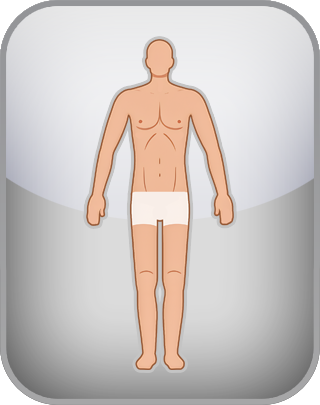Somatotype Test
The American psychologist William H. Sheldon's theory of somatotypes categorizes body types into ectomorph, mesomorph, and endomorph and links them to psychological traits. This test measures Sheldon's proposed psychological characteristics to assess which of the somatotypes you align with.
To take the test, enter your input below.
Question 1 of 36
I rarely feel at peace with myself.
| Disagree | Agree |
NEXT
The IDRLabs Somatotype Test is inspired by psychometric methodology and research by psychologist William H. Sheldon on the morphology of ecto-, meso-, and endomorphic phenotypes.
The test provides feedback such as the following:
Ectomorph: Physiologically characterized by a lean and delicate body build, ectomorphs typically have long, thin limbs and muscles. They possess a fast metabolism, which makes gaining weight and muscle mass challenging. Ectomorphs are often associated with lower body fat, and their physique can appear more fragile compared to other types. This body type is thought to be less suited for sports that require significant muscle bulk but is advantageous in endurance sports where a light frame is beneficial. Psychologically, ectomorphs are often described as introverted and thoughtful, with a tendency towards self-consciousness and anxiety. They may prefer solitary activities and exhibit a cerebral approach to problem-solving.
Mesomorph: This body type denotes a well-proportioned frame with a significant ability to develop muscle mass and strength. Mesomorphs typically have a naturally athletic and robust build, featuring broad shoulders and a narrow waist. They are characterized by an efficient metabolism, which allows them to gain muscle and burn fat more effectively than the other types. This physiological advantage makes mesomorphs well-suited for dynamic sports that require power and speed. Psychologically, mesomorphs are often perceived as confident, outgoing, and dynamic. They are thought to be more aggressive and competitive, traits that are believed to align with their physical capabilities in sports and active pursuits. The psychological profile includes leadership qualities and a propensity for risk-taking, aligning with their strong and assertive physical presence.
Endomorph: Refers to individuals with a higher proportion of body fat and a generally rounder, softer physique. Endomorphs often struggle with a slower metabolism, making them prone to weight gain. Their bodies are characterized by a solid build, capable of storing more energy, which can be an advantage in activities that require sustained energy. Physiologically, endomorphs may find it more challenging to lose fat and may benefit from tailored diets and regular exercise to manage their body composition effectively. Psychologically, endomorphs are typically portrayed as sociable, easygoing, and relaxed. They are thought to enjoy comfort and may exhibit a more laid-back approach to life, which is sometimes associated with greater social skills but also a tendency towards complacency.
William H. Sheldon, an American psychologist, proposed the theory of somatotypes in the 1940s. It categorizes human physiques and associates them with personality traits.
Here’s the gist of Sheldon’s somatotypes:
-
The three body types:
- Endomorph: Round and soft physique, with a tendency to be relaxed, sociable, and extroverted.
- Mesomorph: Muscular and square physique, associated with activeness, assertiveness, and dominance.
- Ectomorph: Thin and lean physique, thought to be more introverted, thoughtful, and sensitive.
- Somatotype rating: Sheldon developed a system to rate people on a scale of 1 to 7 for each somatotype. A 711 would be an extreme endomorph (round and soft), while a 171 would be an extreme mesomorph (muscular). Most people fall somewhere in between.
- Temperament association: While the core concept is body types, Sheldon linked them to temperament traits he called viscerotonic (relaxed), somotonic (active), and cerebrotonic (restrained).
Criticisms and Current Status:
Sheldon’s theory has been criticized for:
- Lack of rigorous scientific validation for the mind-body connection.
- Overly simplistic categorization of complex human physiques and personalities.
- Potential for misuse in stereotyping people.
Due to these limitations, Sheldon’s somatotype theory is not widely accepted in modern psychology. However, the concept of body types and temperament continues to spark interest, with ongoing research exploring the links between physique, genetics, and personality.
The IDRLabs Somatotype Test is inspired by psychometric methodology and somatotypes as described by William H. Sheldon. While the IDRLabs Somatotype Test is inspired by the research of psychologist William H. Sheldon, it cannot be used to provide clinical assessments or an accurate evaluation of your features. Clinical assessments should always be done in cooperation with a mental health professional. For more information about any of our online tests and quizzes, please consult our Terms of Service.

